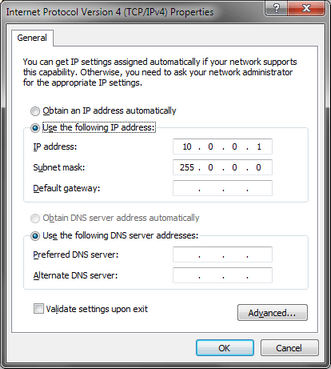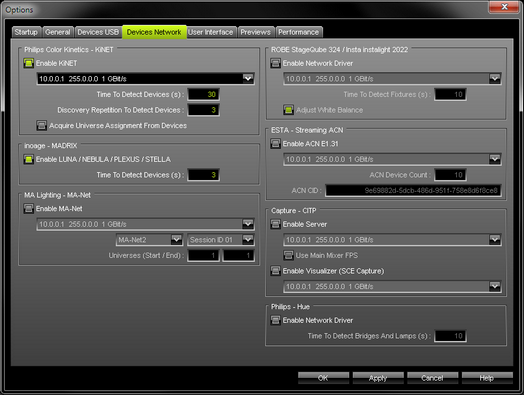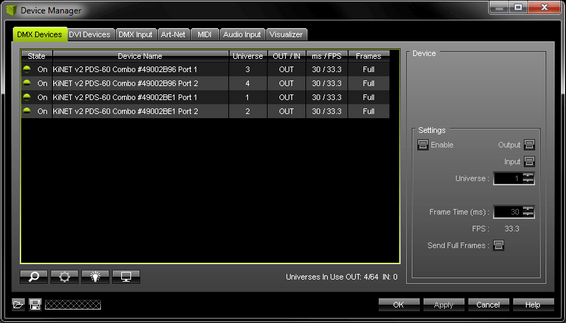Topics of this chapter:
| ▪ | Note |
![]()
MADRIX natively supports Philips Color Kinetics [KiNET]. The protocol is implemented in the software, which makes it easy to use Color Kinetics fixtures and Color Kinetics power supplies with MADRIX.
MADRIX supports
| ▪ | KiNET V1 |
| ▪ | KiNET V2 |
There are several steps required to set up KiNET products in MADRIX. This chapter is only part of the process. You need to set up other configurations as well [such as virtual LED matrix, DMX Devices, MADRIX Effects, Audio, etc.].
1] Set up the correct network settings in Windows.
2] Enable drivers in MADRIX.
3] Activate your devices.
4] Set up the DMX universe.
5] Set up the Frame Time.
1] Windows Network Settings
KiNET is a network-based protocol. MADRIX will use the network card of your computer to send data.
| ▪ | It is required to set up the correct network settings in Windows, first. |
| ▪ | You must use these IP address and Subnet mask settings. Otherwise, KiNET might not work! |
| ▪ | The IP addresses of your computer and your KiNET devices need to be different. |
| ▪ | Set up an individual IP address in the following IP address range: - 10.0.0.1 ... 10.255.255.254 |
| ▪ | Set up the corresponding Subnet mask - 255.0.0.0 |
| ▪ | Restart MADRIX, if you have changed the network settings in Windows while MADRIX was running. |
| ▪ | Check the settings of the Windows Firewall. |
| ▪ | Learn more »Tips [Microsoft Windows / Networks / USB] |
| ▪ | Example for PCs that are running MADRIX: |

2] Enabling Drivers In MADRIX
| ▪ | Go to Preferences > Options... > Devices Network [Keyboard shortcut: Ctrl+Alt+O > Devices Network] |
| ▪ | Activate Enable KiNET |
| ▪ | Choose the correct network/network card from the drop-down list. - Always make sure that you have selected the correct network. Otherwise, the network device might still be found. But no data can be sent. |

| ▪ | Time To Detect Devices (s) - Defines how long MADRIX searches the network for devices during startup. Type in a value in seconds. - The default value is 15. - We recommend to utilize at least a value of 15 to allow for a sufficient search. Higher values are recommended for larger installations. |
| ▪ | Discovery Repetition To Detect Devices - Defines how often MADRIX repeats to search for and discover devices in the network within the Time To Detect Devices (s). - The default value is 3. |
| ▪ | Acquire Universe Assignment From Devices - If activated and if KiNET devices have been fully configured, MADRIX reads the assigned DMX universe from newly found devices and automatically sets it in the Device Manager for these devices. |
3] Activating Device
| ▪ | Go to Preferences > Device Manager... > DMX Devices [Keyboard shortcut: F4] |
| ▪ | MADRIX automatically adds network devices it has found during startup to the list. |
| ▪ | Click - MADRIX disconnects all DMX512, Art-Net, and other devices and starts to search for new or newly connected devices. - Do not rescan for devices if all of your interfaces have been found correctly. |
| ▪ | Select your devices in the list. |
| ▪ | Activate Enable |
| ▪ | Activate Output |
| ▪ | Click Apply |
| ▪ | There is a difference between KiNET V1 and V2. KiNET V2 makes sure that the panels will receive the data at the same time. This is particularly useful for large installations. Please see the Color Kinetics documentation to see which protocol is supported by your power supply. |

5] DMX Universe
| ▪ | Make sure that your device is still selected. |
| ▪ | Set up Universe - Enter the specific DMX universe number |
| ▪ | This setting assigns a specific DMX universe [of the Patch] to the device or the port of the device. |
| ▪ | Make sure the correct universe is assigned according to your requirements. Learn more »Glossary |
| ▪ | Click Apply |
6] Frame Time
| ▪ | Make sure that your device is still selected. |
| ▪ | Set up Frame Time (ms) - The Frame Time affects the Frame Rate. The Frame Rate specifies how fast data is sent to the device or received from it [Frames Per Second; FPS]. - Increase the Frame Time in order to decrease the Frame Rate [e.g., 40ms = 25 FPS]. - Decrease the Frame Time in order to increase the Frame Rate [e.g., 20ms = 50 FPS]. - The default value is 30 ms / 33.3 FPS. - Some LED fixtures might have problems with a high Frame Rate. Then, it is recommended to increase the Frame Time / to decrease the Frame Rate. |
| ▪ | Click Apply |
|
Rescan For Devices - MADRIX disconnects all DMX512, Art-Net, and other network devices and starts a new search for devices. |
|
Highlight - Activates the highlight mode for the selected interface and universe under Preferences > Device Manager... > DMX Devices. Select one or more interfaces and click the button. The corresponding fixtures at the selected interfaces will flash for a better identification or tests. This makes it easier to see them on stage. It considerably speeds up the procedure of programming or testing the selected interfaces. |
|
DMX Watcher - Opens the DMX Watcher to monitor your DMX output or input under Preferences > Device Manager... > DMX Devices |
If wish to resize the window of the Device Manager to see more devices in the list, simply move your mouse pointer to the bottom of this window. Then, select the border and hold the left mouse button, while moving your mouse downwards.
LED Fixtures |
Comments |
Color Kinetics eW Flex SLX |
If your are using a PDS-60ca with one or two strings per controller, a PDS-150, or sPDS-480ca, please select the correct fixture in the »Matrix Generator |
Remember to configure your virtual LED matrix in the »Matrix Generator or »Patch Editor
Make sure to save your MADRIX Setup after the configuration process.
| ▪ | Keep in mind that network devices, if activated, cause network traffic! |
| ▪ | When using a network-based output protocol and when the Startup option Start MADRIX After Booting Windows is used, it is highly recommended to also activate the Startup option Start With Timeout(s) with a value of 30 or higher. |
| ▪ | It is not recommended to use KiNET and communication over the Insta/ROBE protocols in the same network! |
| ▪ | It is not recommended to operate KiNET and access to the World Wide Web/Internet in the same network! It is recommended to run it in a separate network without internet access. |
If you are encountering problems, please work through the following checklist:
| ▪ | Check if all network cables are connected and if Gigabit network components are used. |
| ▪ | Check if your light matrix is configured correctly in the Matrix Generator or Patch Editor |
| ▪ | Have all devices been found under Preferences > Device Manager... > DMX Devices? If not, 1] Check if the IP address and Subnet mask are configured correctly in Windows and your devices. 2] Go to the Preferences > Options > Devices Network. Select Enable KiNET 3] Go to the Preferences > Options > Devices Network. Select the correct network card in the section Philips Color Kinetics - KiNET 4] Go to the Preferences > Options > Devices Network. Increase the value for Time To Detect Devices (s) in the section Philips Color Kinetics - KiNET 5] Click Rescan For Devices under Preferences > Device Manager... > DMX Devices. 6] Try and deactivate your Firewall in Windows. 7] Make sure that the network is not forming a ring, were the start point is also the end point, and that data is not sent back to the source [the computer]. |
| ▪ | Are all devices activated under Preferences > Device Manager... > DMX Devices? Check if Enable and Output are activated. |
| ▪ | Check if all ports you are using on your device are configured correctly. Please check if ports, that are not used, are deactivated in MADRIX. |
| ▪ | Check if the DMX addressing and DMX universes are assigned correctly. Also check the Patch. |
| ▪ | Test if MADRIX is connected to the devices. Use Highlight Device for each of your devices. |
| ▪ | Go to Tools > Task Watcher. Check if the devices are sending data. |
| ▪ | Go to Tools > Logfile. Check if any error or warnings occur regarding the network or KiNET. |
| ▪ | Make sure all power supplies and controllers are working correctly. |
| ▪ | Remove any routers from the network. |
Addressing And Configuration
| ▪ | Regarding the configuration and addressing of Philips Color Kinetics lighting fixtures and power supplies, the company offers extensive information on the following website: »http://www.colorkinetics.com/support/addressing/ |
| ▪ | In addition, there is a software tool called QuickPlay Pro for configuration and multiple addressing. Here is an excerpt from the website: |
"With QuickPlay Pro, you can:
| ▪ | Use serial numbers to program fixtures with light numbers or DMX addresses |
| ▪ | Assign base light numbers to power / data supplies, allowing automatic fixture configuration |
| ▪ | Test light numbers and DMX channels |
| ▪ | Demonstrate a lighting system using four built-in light shows: fixed color, color wash, rainbow, and streak" |
| ▪ | For example, the tool can be used to change the IP addresses of Color Kinetics lighting fixtures. |
| ▪ | Please note: Working with such a tool is only recommended for advanced users because settings can easily be adjusted wrong! |
| ▪ | You can download the tool on the website mentioned above or at »http://www.colorkinetics.com/support/downloads/ |
| ▪ | The download archive for older products can be found at »http://www.colorkinetics.com/support/downloads/archive/ |
Information About PDS-60ca Power Supplies
The PDS-60ca is a well-known and often used power/data supply from Philips Color Kinetics. Three different versions are offered:
| ▪ | PDS-60ca PREPROGRAMMED |
| ▪ | PDS-60ca DMX |
| ▪ | PDS-60ca ETHERNET |
You can identify your version of the device using the following item numbers written on the case of the PDS-60ca:
| ▪ | 109-000016-00 [Pre-programmed] |
| ▪ | 109-000016-01 [DMX] |
| ▪ | 109-000016-02 [Ethernet] |
| ▪ | The PDS-60ca DMX supports DMX512 via an extra interface [controlled by MADRIX] or Color Kinetics DMX controllers. The PDS-60ca ETHERNET uses KiNET and can be controlled via MADRIX without an extra interface. And the PDS-60ca PREPROGRAMMED does not support external data input. |
Information Update
The official website now only lists two PDS-60ca. The second power supply now automatically switches between DMX and Ethernet mode.
| ▪ | 109-000020-00 PDS-60ca 12V [Pre-programmed] |
| ▪ | 109-000020-03 PDS-60ca 12V [DMX / Ethernet] |